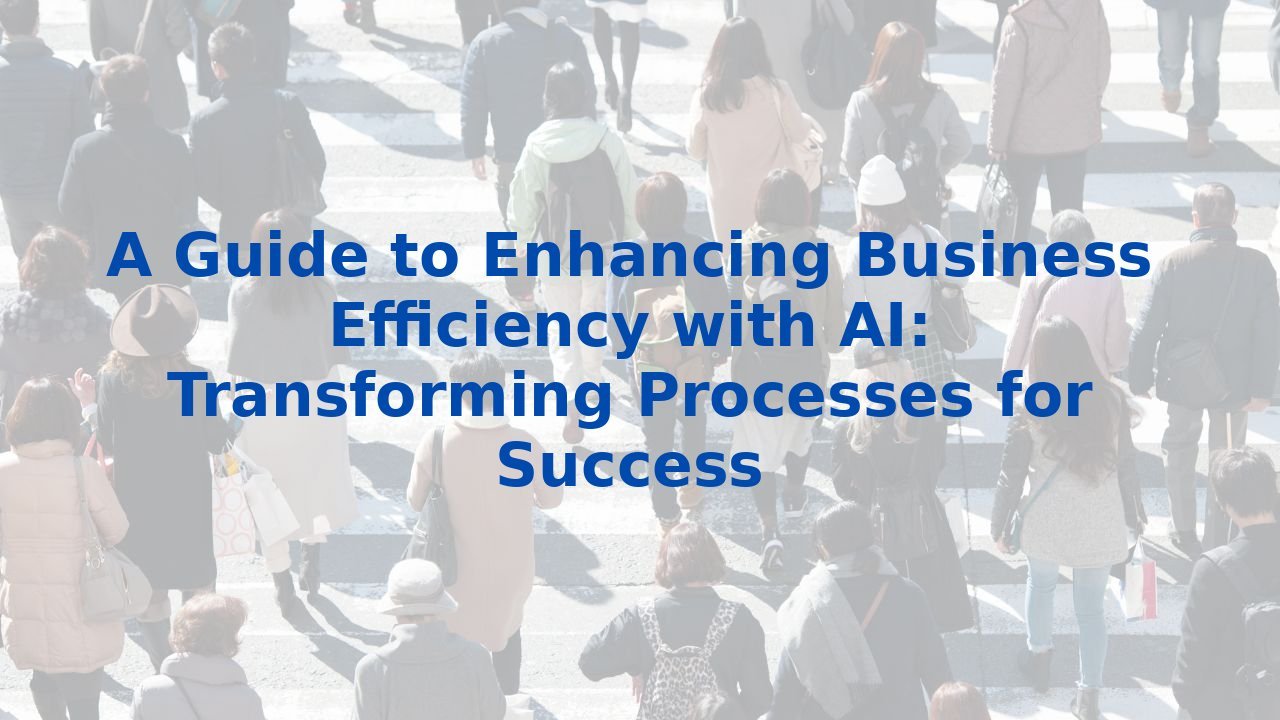A Guide to Enhancing Business Efficiency with AI: Transforming Processes for Success
A Guide to Enhancing Business Efficiency with AI: Transforming Processes for Success
In today's fast-paced and competitive landscape, businesses are constantly striving for operational excellence. With the rise of Artificial Intelligence (AI) technology, organizations can now unlock new levels of efficiency and innovation that were previously unimaginable. This guide will delve into how AI can transform essential business processes and the profound impact it can have on overall organizational success.
The Role of AI in Business Process Management
1. Process Discovery and Mapping
The first step in enhancing process efficiency is understanding existing workflows. AI excels at uncovering and mapping these processes through techniques such as process mining and pattern recognition. By providing a clear picture of current operations, AI helps organizations identify inefficiencies and bottlenecks that often go unnoticed by human analysis. This insight is invaluable as it sets the stage for meaningful improvement initiatives.
2. Process Automation
Automation is perhaps one of the most transformative benefits that AI offers. By deploying AI bots to take care of repetitive tasks, organizations can free up valuable human resources to focus on more strategic initiatives. Not only does this automation save significant time, but it also minimizes the risk of human error—substantially enhancing productivity across the board.
3. Continuous Improvement
AI isn't just a one-time investment; it facilitates ongoing improvement within business processes. By leveraging historical data and analyzing real-time operations, AI systems can provide ongoing feedback and data-driven recommendations. This iterative approach ensures that processes evolve alongside the business and remain aligned with organizational goals.
Enhancing Specific Business Processes
1. Meetings and Communication
Meetings are often the lifeblood of an organization but can become bogged down by administrative tasks. AI can streamline these processes by automating scheduling and note-taking. Imagine having voice assistants that not only schedule your meetings but also capture key highlights, providing actionable notes afterward. This way, communication becomes more effective and time-efficient.
2. Sales and Marketing
In the realm of sales and marketing, AI-driven analytics provide powerful insights into customer behavior. These insights enable teams to predict potential revenue opportunities and tailor strategies accordingly. Additionally, incorporating chatbots can significantly enhance customer interactions by providing instant solutions to common queries, leading to increased satisfaction and loyalty.
3. Customer Service
Customer experiences are essential for brand success. AI systems can assess service quality and identify problematic interactions with precision that surpass traditional methods. This capability contributes to maintaining high service standards and ensuring customer satisfaction is consistently met.
4. Product Development
AI can revolutionize product development through generative design software, which explores multiple design possibilities based on predefined parameters. This method saves both time and resources by avoiding unnecessary prototypes, allowing businesses to innovate and get products to market faster.
Benefits of AI for Business Efficiency
1. Faster Data Analysis
AI accelerates the data analysis process, organizing and interpreting large datasets to reveal trends and predictive insights. This facilitates quicker, more informed decision-making at all levels of the organization.
2. Improved Decision Making
AI shines in optimizing decision-making processes by simulating various scenarios and recommending the best course of action. This efficiency drastically reduces the time and effort normally required for complex decisions.
3. Enhanced User Experience
With AI's integration into business process management software, user interfaces have become increasingly intuitive, enabling users to design and manage workflows without extensive technical training.
4. Risk Identification and Mitigation
AI's capability to detect anomalies and deviations in data allows organizations to identify risks before they escalate, providing a proactive stance on risk management.
The Importance of Employee Training for AI
Implementing AI is not just about the technology; it's equally crucial to focus on training your employees. Here’s why:
1. Understanding AI Capabilities
It’s crucial that employees grasp the potential and limits of AI tools to harness their full capabilities effectively.
2. Data Analysis Skills
Fostering data analysis skills enables employees to interpret AI-driven insights effectively, leading to better outcomes.
3. Adaptability
Creating a culture of adaptability prepares employees for smooth transitions to AI-enhanced processes, minimizing resistance to change.
4. Continuous Learning
Ongoing training ensures that employees remain adept at using the latest advancements in AI technology, further enhancing their effectiveness and the organization's overall performance.
Conclusion
Artificial Intelligence is not just a trend; it’s a catalyst for transformative change within organizations. By leveraging AI for process discovery, automation, and ongoing improvement, businesses can achieve remarkable operational efficiency. However, it is essential to complement AI integration with robust employee training, ensuring that your workforce is equipped to utilize these powerful tools. Organizations that embrace both AI and employee development will not just survive in the competitive landscape—they will thrive and pave the way for a successful future.



